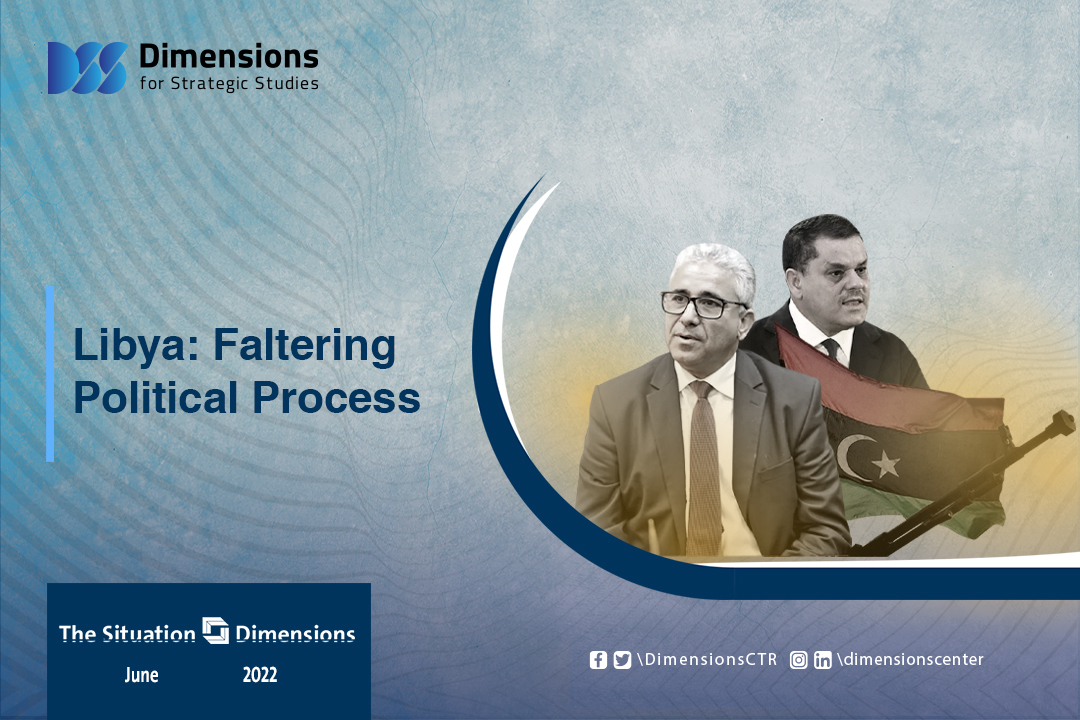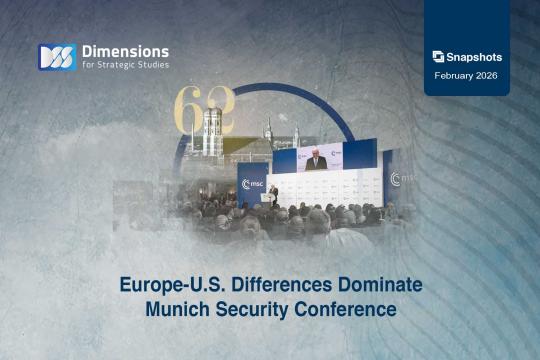
Libya: Faltering Political Process
2022-06-232236 view
Libyans’ continued lack of consensus on constitutional and legal arrangements, the potential fragility of a UN-backed ceasefire, and the emergence of institutional rivalry that threatens Libya’s stability pose challenges to the pursuit of political stability in the country.
The crisis intensified after the indefinite postponement of the December 24, 2021 elections; which led to the split in the government. In March 2022, Libya's parliament withdrew confidence from the national unity government led by Abdulhamid Dbeibah and appointed former Interior Minister, Fathi Bashaga as a new prime minister.
As such, Libya is currently run by two rival governments competing over legitimacy. Such developments led to armed clashes. On June 10, clashes broke out between the Nawasi Brigade, a pro Fathi Bashagha militia and the Stabilization Support Force, which backs Abdul Hamid Dbeibah. Likewise, there were clashes between supporters of Bashagha and Dbeibah in mid-May.
Consequently, several major determinants and main features have emerrged to set the course already complicating political scene in Libya. Such developments turned into reasons hindering a solution in Libya:
1. The continued presence of two seperate governments exercising uncoordinated and conflicting functions on the ground. This state of hostility has contributed to deepening the crisis in the political scene in Libya.
What complicates this scene further is that each party vies to legitimize its work on the ground. The latest of such moves was the Libyan Parliament’s approval on June 15 of the Bashagha government’s budget, at about 89.6 billion Libyan dinars (20 billion US dollars), despite the fact that the Parliament has repeatedly opposed budget proposals previously submitted by the Dbeibah's government.
2. The internal political alignments impede achieving rapprochements between the parties. Currently, political entities and personalities are experiencing a state of widespread polarization as they are divided into several groups: Bashagha's advocates, Dbeibah’s supporters, neutral groups and some others seeking just personal gains.
3. The absence of the effective sovereign institutions in containing the crisis, headed by the High Council of State led by Khaled al-Mashri and the Libyan Presidential Council led by Muhammad al-Menfi. These two parties have (practically) nothing to do with granting legitimacy to the government; as this is the job of the Aqila Saleh-led parliament.
Several meetings have recently been taking place between the former concerned actors. It is expected that Al-Mashri will soon meet Aqila Saleh in Cairo, while the latter met Al-Menfi on June 16 to discuss the political crisis. However, these discussions have yet been ineffective.
4. A deadlock to set a new date for the elections by the High Electoral Commission. Despite the fact that the Head of the Commission, Imad Al-Sayeh, confirmed on June 16 that the Commission will be able to set a date for the elections day next December if it receives the electoral legislation approved by the constitutional base next July. This, however, may not be realistic, especially when determining the constitutional base taking place in Egypt under the auspices of the UN envoy Stephanie Williams, may not be met with consensus among the Libyan parties.
5. The detachment of the 5+5 Libyan Joint Military Commission from the Libyan political track. The major mission allocated to this committe is still to preserve the ceasefire and to keep going on in implementing procedures to get mercenaries and foreign forces out from Libya.
The Commission continues its meetings on a semi-periodic basis, as the last meeting was on June 15 in Cairo. What arouses curiousity is the degree to which the committe can achieve its goals in light of a stifling political crisis in the country. Such a matter might be explained by the fact that there is a fragile or minimal (security) consensus that could maintain the gains of the cease-fire agreement between the parties - with the exception of Bashagha and Dbeibah- and this fragile security consensus is preserved through exerting great international pressure on the Commission, especially by the UN envoy.
That is to say, the political crisis in the country could slightly effect security. Therefore, whatever clashes that might occur between Bashagha and Dbeibah supporters, they would not develop into a complete collapse of the ceasefire. This is , in fact, the borderline between the perpetuation of the political crisis and the transition to a civil war.
Based on the aformintion, the determinants of the Libyan crisis have become more complicated than ever before. In the absence of agreement or trust between the country's political elites, bleak scenarios cannot be ruled out. Most likely, if the political crisis between the two governments continues. Add to that not setting a spesific date for elections until the end of the year; which will have repercussions will have very negative consequences.
On the other hand, the competing international interests in Libya is currently passing through a state of stagnation. It is clear that there is a hiding consensus among the major arpitors in the Libyan scene that establishing political stability is necessary to preserve interests and gains. Meanwhile, it is likely that Egypt and Algeria - i.e., the bordering countries - will continue to lead the efforts to establish peace in Libya without the direct involvement of other players in the short term.





